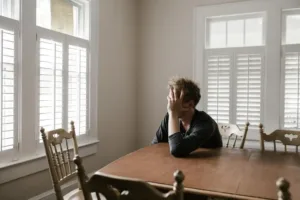Why Depression Keeps Coming Back: Strategies for Resilience
It’s disheartening when depression returns, just as you think you’ve recovered. Around 21 million adults in the U.S.A have experienced at least one major depressive episode. After having one episode of depression you are at risk of having a return of depressive symptoms. “It can feel hopeless and overwhelming when depression keeps coming back. Remember you are not alone, this is common and there is hope” explains Stephen Rodgers, LCSW. This cycle can be incredibly frustrating, leaving you feeling helpless. You may question if true recovery is possible. However, recurring depression isn’t a sign of failure, but rather, a signal to adjust your approach.
If you are having suicidal thoughts or a mental health crisis call or text 988
Why Does Depression Keep Coming Back?
Several factors can contribute to depression relapse. Understanding these is crucial for proactive management. Stressful life events, like job loss or relationship problems, can trigger a depressive episode.
A professional evaluation and diagnosis are crucial to determining the cause.
Underlying Medical or Mental Health Conditions
Sometimes, depression is a symptom of an underlying condition like untreated anxiety, depression, PTSD, or substance use disorders. “It’s very common to see patients who experience depression and another mental health disorder. Both need to be treated” says Stephen Rodgers, LCSW director of Denver Men’s Therapy. Treating the root cause might alleviate your depression.
A thorough evaluation is important to rule out contributing factors. Guidance is available at SAMHSA’s National Helpline.
Male Depression is often overlooked, know the signs of Male Depression.
What Can You Do When Depression Keeps Coming Back?
Recurring depression doesn’t have to define you. Effective strategies exist, and recovery is possible. The cycle can be broken. Hope remains, even when depression keeps coming back.
Recognize the Early Signs and Symptoms
Early intervention is crucial in managing mental health relapses. The faster you identify relapse symptoms, the better you can manage them, and the less severe they are likely to become.
Common Early Warning Signs
Keep an eye out for the following depression symptoms and early signs of relapse:
- Changes in sleep patterns: insomnia or oversleeping can be a red flag for an impending relapse.
- Loss of interest in previously enjoyed activities: if you find yourself struggling to find pleasure in things you once loved, it may be a sign that something is amiss. However, it’s worth noting that with dedicated effort, your interest may return.
- Increased irritability or anxiety: feeling on edge or quick to anger can be a sign that your mental health is taking a hit.
- Fatigue and low energy: if you’re feeling drained or exhausted, it may be a sign that you’re headed for a relapse.
- Difficulty concentrating: struggling to focus or stay engaged can be a sign that your mental health is suffering.
- Changes in appetite or weight: fluctuations in your appetite or weight can be a sign of an impending relapse.
Don’t Assume It Will Be the Same
Recurrences may not always mirror previous episodes. If something feels off, even if it’s not exactly like previous relapses, talk to your doctor or therapist. Early intervention can significantly affect how severe a relapse becomes.
Remember, Early Intervention is Crucial
“The sooner you seek help, the better equipped you’ll be to manage your symptoms and prevent a full-blown relapse.” -Stephen Rodgers, LCSW
Don’t hesitate to reach out for support if you’re experiencing any of these early warning signs.
Early intervention is crucial in managing mental health relapses. The faster you identify relapse symptoms, the better you can manage them, and the less severe they are likely to become.
Stopping Medication or Therapy Prematurely
One of the biggest mistakes is stopping medication or therapy too soon, even if you feel better because it can trigger a depression relapse. Depression often requires ongoing management. Stopping prematurely, before your doctor recommends it, increases the depression relapse rate. Research at The Recovery Village supports this.
The Risks of Stopping Medication Abruptly
Stopping depression medication without consulting your doctor can also be very dangerous and lead to severe anxiety and depressive symptoms. This is because your body has adapted to the medication, and sudden withdrawal can cause a rebound effect, making your symptoms worse than before.
Withdrawal Symptoms
- Anxiety: You may experience increased anxiety, restlessness, and feelings of unease.
- Depressive Symptoms: Stopping medication abruptly can lead to depressive episodes, mood swings, and irritability.
- Other Symptoms: You may also experience headaches, dizziness, nausea, and insomnia.
Why Consulting a Doctor is Crucial
It’s essential to consult your doctor before stopping any medication, as they can help you gradually taper off the medication to minimize withdrawal symptoms. Your doctor can also monitor your progress and adjust your treatment plan as needed.
The Importance of a Collaborative Approach
Remember, your doctor is your partner in managing your mental health. Open communication is key to ensuring a smooth transition and minimizing the risk of severe symptoms. Don’t hesitate to reach out to your doctor if you’re considering stopping your medication.
Being Proactive is Key
Being mindful of small changes is vital in disrupting the cycle of relapse before it takes hold. This means paying attention to subtle shifts in your mood, behavior, and physical well-being.
Professional Help and Treatment Options
Professional help is essential for treating depression. Consistent professional guidance is crucial, especially for recurring depression. Seeking depression treatment early can prevent symptoms from worsening.
Several depression treatment options can help. Explore the various possibilities to determine the best for your personal experience.
Types of Therapy
Various forms of depression counseling can be effective. Each type of therapy has its own unique approach and techniques.
Eye Movement Desensitization and Reprocessing (EMDR)
EMDR is a therapy that is used to treat a number of mental health issues. EMDR is an evidence-based treatment for depression. It is based on the idea that negative memories are stored in a “frozen” state and that eye movements can help to “unfreeze” them, allowing the brain to process and integrate the experiences.
Cognitive-Behavioral Therapy (CBT)
CBT is a problem-focused approach that aims to identify and change negative thought patterns and behaviors. It is based on the idea that our thoughts, feelings, and actions are interconnected and that by changing one aspect, we can have a positive impact on others.
Psychodynamic Therapy
Psychodynamic therapy is a type of talk therapy that focuses on helping patients understand and resolve unconscious feelings and conflicts. It is based on the idea that our unconscious mind plays a significant role in shaping our thoughts, feelings, and behaviors and that by exploring and understanding our unconscious motivations, we can gain insight and make positive changes.
These therapies can be used alone or in combination with other forms of treatment, such as medication, to help individuals manage their mental health and improve their overall well-being.
- Medication: antidepressants, mood stabilizers.
- Lifestyle Changes like exercise, diet, mindfulness, sleep hygiene. Pay attention to any physical aches you may be experiencing and talk with a health professional.
- Alternative Treatments (acupuncture, yoga, meditation).
Advanced Treatment: Ketamine Therapy
Ketamine therapy offers hope for men struggling with treatment-resistant and severe depression—especially when depression keeps coming back despite traditional treatments. According to an article published in the New England Journal of Medicine, ketamine provides sustained improvement in depressive symptoms without major side effects. Unlike standard antidepressants, which can take weeks to work, ketamine therapy often provides rapid relief by targeting brain pathways linked to depression relapse. Many men who have felt stuck in a cycle of recurring depression find that ketamine therapy helps restore motivation, emotional balance, and clarity. If past treatments haven’t worked, or the depression keeps returning, ketamine may be a breakthrough option worth exploring.
Ketamine Treatment Options
- Ketamine Assisted Psychotherapy
- Ketamine-Assisted Group Therapy
- Ketamine IV
Developing Coping Mechanisms: Lifestyle Adjustments and Support Systems
Lifestyle adjustments are crucial for managing recurring depression. These are long-term building blocks for mental wellness, not quick fixes.
Support is essential during vulnerable periods. Here are some beneficial techniques and resources. It’s a good idea to avoid alcohol when you feel depression coming back, as drinking alcohol can worsen symptoms.
| Coping Mechanism | How It Helps |
|---|---|
| Regular Exercise | Releases endorphins, improves mood, and reduces stress (source). Regular exercise is highly recommended as part of any treatment program. |
| Mindfulness and Meditation | Helps focus on the present moment, reducing overthinking and worry. This helps address rumination, a common symptom when your depression keeps coming back . |
| Healthy Diet | Provides essential nutrients for brain health. Eating healthy, along with regular sleep, are cornerstones for improved physical and mental well-being. |
| Consistent Sleep Schedule | Regulates circadian rhythm, improves sleep quality, and stabilizes mood. A regular sleep schedule can make a world of difference when symptoms return. |
| Strong Social Connections | Reduces isolation, provides emotional validation, and improves overall well-being. Connecting with others facing similar challenges empowers through support groups or online forums like Bezzy. They offer community and shared experience, especially when you feel depression keeps coming back . |
| Journaling | Provides a space for thoughts, tracks changes, and helps understand thought patterns. Journaling can be a helpful tool for understanding potential triggers. |
| Practicing gratitude | Shifts focus toward positivity ( source ). It helps in challenging negative thought patterns that accompany depression. |
When Depression Keeps Coming Back: The Importance of Self-Care
Self-care is essential for managing recurring depression. It’s not selfish; it’s essential maintenance for your mind and body. Self-care provides the tools to cope when symptoms continue.
Identify activities that nurture your well-being, especially during or after an episode. These small acts are crucial for preventing downward spirals and managing depression relapse symptoms.
- Engaging in relaxing activities like reading, warm baths, hobbies, and nature. These can offer respite and emotional grounding.
- Establishing firm boundaries to prevent stress. This takes courage but is vital for managing mental health when depression recurs.
- Limiting exposure to negative news and social media. This reduces mental noise and overwhelming information, which can negatively impact a vulnerable state. This can also be important when trying to prevent depression.
Conclusion
Recurring depression can feel incredibly isolating and even shameful. However, millions share this experience. You are not alone, and recovery is possible. Relapses are disheartening, but not a sign of failure.
Be patient with yourself, prioritize your well-being, and celebrate small wins. Remind yourself of your strength and resilience. Consistent professional guidance can provide tailored tools for managing the ups and downs of depression.
SAMHSA offers resources and support. Share stories and find mental health and substance abuse support at SAMHSA . They also provide substance abuse prevention programs and have increased funding for mental health initiatives.
Frequently asked questions
Q1. What are the typical phases of a depression episode? Depression episodes usually progress through stages, starting with early warning signs and advancing to full symptoms. These can include persistent sadness, depressed mood, changes in sleep patterns, social withdrawal, difficulty concentrating, and physical symptoms like aches and headaches. The duration and intensity of these phases can vary among individuals.
Q2. How can I identify my personal depression triggers? Identifying personal triggers involves careful observation of environmental and situational factors. Keep a daily log of your mood, activities, and experiences. This can help you recognize patterns and correlations between your depression symptoms and specific events, such as changes in sleep, social interactions, work stress, or seasonal changes.
Q3. What are some effective treatment approaches for recurring depression? Effective treatment for depression relapse often involves a combination of approaches. These may include medication management, psychotherapy (such as EMDR), and other treatments like exercise or mindfulness practices. Some innovative treatments, like ketamine therapy, have shown promise for rapid relief in treatment-resistant cases.
Q4. How can I build a relapse prevention plan for depression? A comprehensive relapse prevention plan should include daily maintenance strategies, an emergency response protocol, and a strong support system. This involves establishing consistent routines, practicing stress management techniques, identifying warning signs, listing emergency contacts, and maintaining regular communication with healthcare providers and trusted individuals.
Q5. What lifestyle changes can help manage recurring depression? Adapting lifestyle habits is crucial for managing recurring depression. This includes maintaining regular sleep patterns, creating structured meal schedules, engaging in regular physical activity, developing stress management techniques, and maintaining daily self-care routines. Additionally, fostering strong social connections and maintaining a healthy work-life balance can significantly improve outcomes.

About the Author Stephen Rodgers, LCSW | Founder of Denver Men’s Therapy
Stephen Rodgers is a licensed clinical social worker and the founder of Denver Men’s Therapy, Colorado’s leading therapy practice focused exclusively on men’s mental health. With over 15 years of specialized clinical experience treating trauma, depression, anxiety, addiction, and relationship challenges, Stephen has established himself as a leading authority in male-centered therapy approaches throughout the Rocky Mountain region.
As a passionate advocate for men’s wellness, Stephen has trained clinicians across the country on EMDR (Eye Movement Desensitization and Reprocessing) and trauma-informed care. He is particularly known for helping men overcome the stigma around mental health and engage in therapy that respects their values, strengths, and goals.
Stephen is a contributor to blogs and podcasts on topics including complex PTSD, male depression, masculinity, and treatments like ketamine-assisted psychotherapy. His writing blends clinical depth with real-world relatability, making complex psychological topics accessible to men and their families.
When he’s not working with clients or developing new therapeutic programs, Stephen enjoys fly fishing, skiing, and exploring Colorado’s backcountry with his family.














